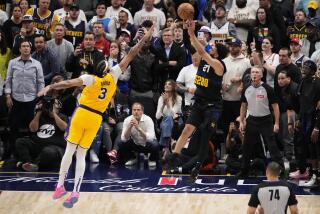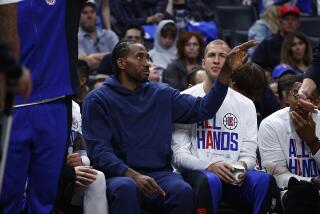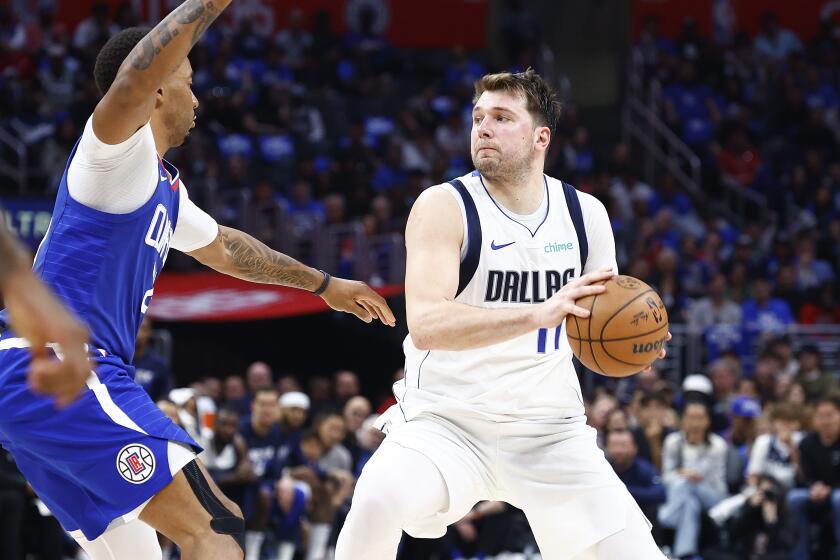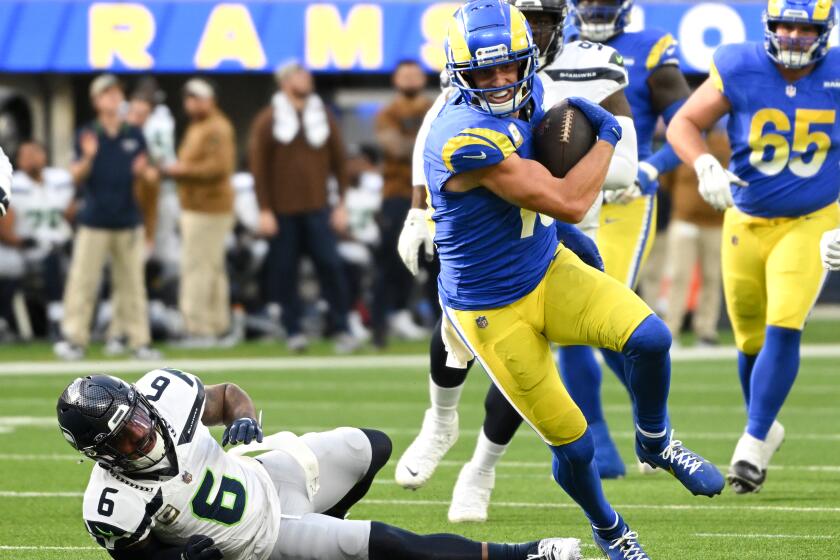Coach for life
When I think today of the greatest sportsman who walked a sideline, I think, instead, of where John Wooden lay his head.
It was a tiny bed in a cluttered room in the dark Encino condo where he lived for the last three decades.
He showed it to me once, without a trace of discomfort or embarrassment, led me inside and pointed to the threadbare white bedspread, Coach still coaching.
“That’s Nell,” he said.
It was, indeed, a smiling picture of his beloved late wife of 53 years, propped up above the pillow where he slept.
In the space next to the pillow, where Nell used to sleep, there was another propped-up photo of her.
Below that photo, in the middle of the bed, was a bundle of carefully scripted letters, all in the same intricate handwriting.
“Fan mail?” I asked.
“You might say that,” he said.
The letters had been written by Wooden to Nell.
They contained humble descriptions of his day, gentle laughs over private jokes, eternal promises of his affection.
They had been written once a month, every month, since 1985.
They had been written after she died.
“I obviously don’t have anywhere to send them,” he said. “But I had to write them anyway.”
He said he had talked to his wife every day for more than half a century, and it still wasn’t enough. He wondered, when you are best friends, can it ever be enough?
“I miss telling her things,” he said.
As he led me out of the bedroom in that darkened apartment, I realized he taught me again, only this time it was something that cannot be found in a pyramid or a rolled-up program.
I realized that I had just been given a glimpse into a lifetime of simple devotion, from Nell to UCLA, from a sport that didn’t deserve it to children who will never understand it.
Coach had just shown me the meaning of undying love, and, as he led me out of the darkened room, I quietly wept at its power.
This, though, is why I will not weep today, in the wake of John Wooden’s death at age 99.
Our loss will be his gain.
He will no longer have to sleep with a photo. He will no longer have to pick up a pen. The light of our lives can finally be with the light of his life.
All these things he has wanted to share with Nell, he can finally tell her himself.
“I haven’t been afraid of death since I lost Nell,” Wooden told me that day. “I tell myself, this is the only chance I’ll have to be with her again.”
Heaven knows, he has earned it.
When the great ones leave our courts and fields, don’t they usually leave our lives?
Jackie Robinson died young, Muhammad Ali lost his voice, Michael Jordan lost his basketball sense, and Joe Montana refused to be honored at the Super Bowl unless he was paid.
When the great ones retire, so, often, does their greatness.
But John Wooden was different. Has any sports figure ever broken every record in his field, then contributed more to the world after the games ended?
Wooden will be remembered today as Coach by those who never even knew he coached.
He won 10 national titles at UCLA, a record that will never be broken, yet many know him only for applying those lessons to real life.
He spent 27 years coaching the Bruins. But after his retirement in 1975, he spent the next 35 years coaching, well, the rest of us.
Guess which job had more impact?
Hint: It was not the one where he earned the name the Wizard of Westwood.
“I am not a famous man,” Wooden said. “I hate being called wizard. I am not a wizard.”
Everyone called him Coach, and he was a teacher, and that is how he will be remembered, the sports world’s greatest teacher, a man whose quiet voice somehow rose above the clatter of those who had long stopped listening.
He will be remembered not for diagraming a triangle offense, but for writing a pyramid bible, his Pyramid of Success long since becoming the best-known sports motivational tool.
He will be celebrated not only for sitting on the UCLA sideline, but for being in the bleachers just above the UCLA bench, where he sat for nearly every home game after his retirement, signing autographs and spinning wisdom.
He will be known not only for his loyalty to his many great players, but for his loyalty to his late wife; he once insisted that if the Pauley Pavilion court was named after him, Nell’s name would have to come first, and so it does.
He will be applauded not for any endorsements, but for the one sponsorship he canceled. He removed his support of the John R. Wooden Award -- college basketball’s Heisman -- when he believed that organizers weren’t playing fair with his name.
During a time when the sports world was drastically changing, John Wooden never budged an inch, and in doing so, he moved us forever.
He was the only major basketball figure to disdain the NBA for the WNBA because he loved the fundamentals.
The last time he was seen at a prominent baseball game, it didn’t involve the Dodgers; it was in Anaheim during the 2002 World Series, Coach preferring to support an Angels team that could bunt and steal and think.
His wisdom of “failing to prepare is preparing to fail” works better than ever on today’s self-entitled athletes.
His bromide, “The man who is afraid to risk failure seldom has to face success” could be the motto of every modern, Internet-hounded, alumni-harassed college coach.
What he said back then works even better now, and so for years he never stopped saying it, giving speeches to groups who couldn’t pay, spending time with kids who had no idea.
Because his words will last forever, it is impossible to imagine that he did not.
But we are comforted in knowing that he is reunited with his inspiration while leaving us with plenty.
“Be quick,” we wanted to tell Coach before he set off for Nell and immortality, “but don’t hurry.”
--
--
BEGIN TEXT OF INFOBOX
THEY SAID
Memories of Wooden:
“What he did was produce leaders. . . . His ‘Pyramid of Success’ hangs in my office to remind me every day of what it takes to be an effective leader.”
-- Gene Block, UCLA chancellor
“He was not only the greatest coach in the history of any sport, but he was an exceptional individual that transcend-ed the sporting world.”
-- Dan Guerrero, UCLA athletic director
“He was a disciplinarian. We learned all about those aspects of life that most kids want to skip over. He wouldn’t let us do that.”
-- Kareem Abdul-Jabbar, UCLA player, 1966-69
“He is such a positive influence on everyone. He has taught me everything I know. Not so much about basketball, but about life.”
-- Bill Walton, UCLA player, 1971-74
“His lessons made sense then and they make sense now.”
-- Marques Johnson, UCLA player, 1973-77
“He was a person who not only affected how you played the game but how you lived life. What he taught us will be part of me all my days.”
-- Rafer Johnson, Decathlon champion, UCLA player, 1958-60
“It wasn’t until years later, after college, after the NBA, when my life focus began to change on marriage, divorce, children the business world, that I began to sense how special a man he was.”
-- Jamaal Wilkes, UCLA player, 1971-74
“He’s a legend and national treasure who was a coach, but his life meant so much more than being a coach. Think of all the lives outside of sports who were touched by him. We’re talking millions of people.”
-- Ben Howland,UCLA coach
----
WOODEN THROUGH THE YEARS
Early years
1910: Born the third of six children to Joshua and Roxie Wooden on Oct. 14, in Hall, Ind. His father, a rural mail carrier, takes care of the family farm, which has no running water or electricity. Like many farm families, the Woodens go bankrupt and lose their farm, shortly after moving to Martinsville, Ind.
1924-28: Wooden is a star athlete at Martinsville High. A four-year letter-winner, he leads his team to the state championship in 1927 and is runner-up twice (1926 and 1928). He is named All-State from 1926 to ’28. During his freshman year, he meets Nellie Riley at a carnival. Describing it years later as love at first sight, the pair decides to marry as soon as John finishes college.
1928-32: Turning down a job to play professional baseball, Wooden enters Purdue University to study civil engineering but becomes an English major instead. He is named All-American for three years and graduates in 1932. That year Purdue wins the national title and he’s named college basketball player of the year.
1932: Marries Nellie Riley, who he would later describe in his autobiography, “They Call Me Coach,” as “a pert, vivacious, captivating girl with a very vibrant personality.”
Coaching years
1932-34: Takes his first teaching job at Dayton High in Kentucky, where he teaches English and coaches all of the school’s athletic teams. In his first year as basketball coach, the team has a losing season, the only one in Wooden’s career. Over eight seasons (1932-39) he plays 46 professional games and averages 9.8 points. At one point he makes 138 straight free throws while playing for the Independent League Indianapolis Kautskys.
1934-43: Coaches at Central High in South Bend, Ind. His overall high school coaching record is 218 wins and 42 losses.
1942: Enlists in the U.S. Navy. Serves as a physical education instructor in World War II. Appendicitis keeps him from fighting in the South Pacific.
1946-48: After his discharge from the Navy, moves to Terre Haute, Ind., to coach at Indiana State Teachers College (now Indiana State). Coaches Sycamores to two-year record of 47-14 and conference title in 1947. Team advances to finals of the NAIA tournament in 1948.
1948: Named head coach at UCLA and guides floundering program (three winning seasons in previous 17 years) to first-year record of 22-7.
1949: Bruins win first conference championship.
1950: Leads UCLA to team’s first NCAA tournament.
1956: UCLA completes a perfect league season (16-0), the first of eight under Wooden.
1960: Inducted into basketball Hall of Fame as a player.
1964: UCLA completes 30-0 season and beats Duke to win its first NCAA title. Wooden named NCAA coach of the year for the first of six times.
1965: UCLA beats Michigan for title No. 2. In the fall, Wooden has his eye on a prized recruit from Power Memorial in New York. He even uses Jackie Robinson to put a good word in about the program. When Lew Alcindor decides to enroll at UCLA, he becomes the first transcontinental college basketball star. Many believe Alcindor’s 1965-66 freshman team could have beaten any varsity team in the country.
1967: Wooden and UCLA win their third NCAA championship.
1968: In front of 52,693 fans in the Astrodome, coaches the first televised collegiate game in prime time. Wooden’s No. 1-ranked Bruins, led by Alcindor, lose, 71-69, to No. 2 Houston, led by future Hall of Famer Elvin Hayes. UCLA later beats North Carolina to win its fourth national championship.
1969: UCLA becomes the first school to win three straight national titles and Wooden gets No. 5 in victory over his alma mater, Purdue.
1970: Jacksonville falls in final as Bruins celebrate sixth NCAA title and fourth in a row.
1971: Defeating Villanova, Bruins win seventh NCAA title, the fifth straight.
1972: Another perfect season (30-0) and national title (eighth) with win over Florida State.
1973: Inducted into basketball Hall of Fame as a coach, the first to do so as player and coach. Named Sports Illustrated’s “Sportsman of the Year.”
1974: Notre Dame ends UCLA’s 88-game winning streak. Win over Memphis State is for ninth NCAA championship.
1975: After UCLA wins in overtime against Louisville in the semifinals of the NCAA tournament, Wooden decides to tell his players he will retire at the end of the season. A 92-85 victory over Kentucky gives Wooden his 10th national title. “He has been college basketball,” then-UCLA athletic director J.D. Morgan says on the day Wooden announces his retirement. “He has been the game. He’s compiled records nobody is going to equal.”
1977: UCLA’s Marques Johnson is the first player presented with the John R. Wooden Award, given to the “most outstanding college basketball player in the United States.” Not only is the player’s performance taken into account by a national panel of sportswriters, but also his character.
1985: His wife of 53 years, Nell, dies. John is first sports figure to receive the Bellarmine Medal of Excellence. One of the past recipients is Mother Teresa, whom Wooden once said he would most like to have dinner with along with Jesus Christ and Abraham Lincoln.
1994: UCLA beats Kentucky, 82-81, in the first John Wooden Classic. During the same season, the Bruins win their first NCAA title since Wooden’s final-game victory over Kentucky in 1975.
1999: Named by ESPN as the greatest coach of the 20th century.
2003: Nell and John Wooden Court dedicated at Pauley Pavilion on Dec. 20 against Michigan State. President George W. Bush presents Wooden with the Presidential Medal of Freedom, the highest civilian honor an American can receive.
2009: Wooden is selected as the “Greatest Coach in American Sports History” by the Sporting News.
More to Read
Get our high school sports newsletter
Prep Rally is devoted to the SoCal high school sports experience, bringing you scores, stories and a behind-the-scenes look at what makes prep sports so popular.
You may occasionally receive promotional content from the Los Angeles Times.







